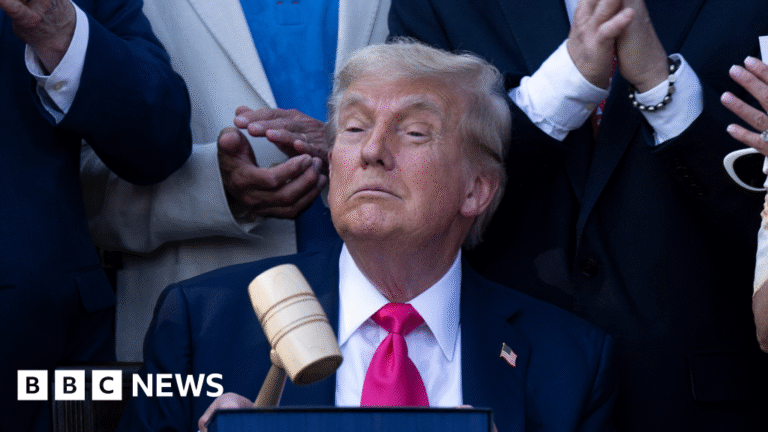Simon Jack
BBC business editor
Getty Images
As Donald Trump cheered the passage of his self-styled, and officially named, Big Beautiful Budget Bill through Congress this week, long-sown seeds of doubt about the scale and sustainability of US borrowing from the rest of the world sprouted anew.
Trump’s tax-cutting budget bill is expected to add at least $3 trillion (£2.2 trillion) to the US’s already eye-watering $37tn (£27tn) debt pile. There is no shortage of critics of the plan, not least Trump’s former ally Elon Musk, who has called it a “disgusting abomination”.
The growing debt pile leaves some to wonder whether there is a limit to how much the rest of the world will lend Uncle Sam.
Those doubts have been showing up recently in the weaker value of the dollar and the higher interest rate investors are demanding to lend money to America.
It needs to borrow this money to make up the difference between what it earns and what it spends every year.
Since the beginning of this year, the dollar has fallen 10% against the pound and 15% against the euro.
Although US borrowing costs have been steady overall, the difference between the interest rates paid on longer-term loans versus shorter-term loans – what’s known as the yield curve – has increased, or steepened, signalling increased doubts about the long-term sustainability of US borrowing.
And that is despite the fact that the US has lowered interest rates more slowly than the EU and the UK, which would normally make the dollar stronger because investors can get higher interest rates on bank deposits.
The founder of the world’s biggest hedge fund, Ray Dalio, believes that US borrowing is at a crossroads.
On its current trajectory he estimates the US will soon be spending $10tn a year in loan and interest repayments.
“I am confident that the [US] government’s financial condition is at an inflection point because, if this is not dealt with now, the debts will build up to levels where they can’t be managed without great trauma,” he says.
So what might that trauma look like?
The first option is a drastic reduction in government spending, a big increase in taxes or both.
Ray Dalio suggests that cutting the budget deficit from its current 6% to 3% soon could head off trouble in the future.
Trump’s new budget bill did cut some spending, but it also cut taxes more, and so the current political trajectory is going the other way.
Secondly, as in previous crises, the US central bank could print more money and use it to buy up government debt – as we saw after the great financial crisis of 2008.
But that can end up fuelling inflation and inequality as the owners of assets like houses and shares do much better than those who rely on the value of labour.
The third is a straightforward US default. Can’t pay won’t pay. Given that the “full faith and credit of the US Treasury” underpins the entire global financial system, that would make the great financial crisis look like a picnic.
‘Cleanest dirty shirt’
So how likely is any of this?
Right now, mercifully, not very.
But the reasons why are not actually that comforting. The fact is, whether we like it or not, the world has few alternatives to the dollar.
Economist and former bond supremo Mohamed El-Erian told the BBC that many are trying to reduce dollar holdings, “the dollar is overweight and the world knows it, which is why we have seen a rise in gold, the euro and the pound, but it’s hard to move at scale so there’s really very few places to go”.
“The dollar is like your cleanest dirty shirt, you have to keep wearing it.”
Nevertheless, the future of the dollar and the world’s benchmark asset – US government bonds – is being discussed at the highest levels.
The governor of the Bank of England recently told the BBC that the levels of US debt and the status of the dollar is “very much on [US Treasury] Secretary Bessent’s mind. I don’t think the dollar is fundamentally under threat at the moment but he is very aware of these issues and I don’t think it is something that he underestimates.”
Debt of $37tn is an unfathomable number. If you saved a million dollars every day, it would take you 100,000 years to save up that much.
The sensible way to look at debt is as a percentage of a country’s income. The US economy produces income of around $25tn a year.
While its debt to income level is much higher than many, it’s not as high as Japan or Italy, and it has the benefit of the world’s most innovative and wealth creating economy behind it.
At home I have a book called Death of the Dollar by William F Rickenbacker in which he warns of the risks to the dollar’s status as the world’s reserve currency. It was written in 1968. Mr Rickenbacker is no longer with us – the dollar is.
But it doesn’t mean that its status and value is a divine right.
